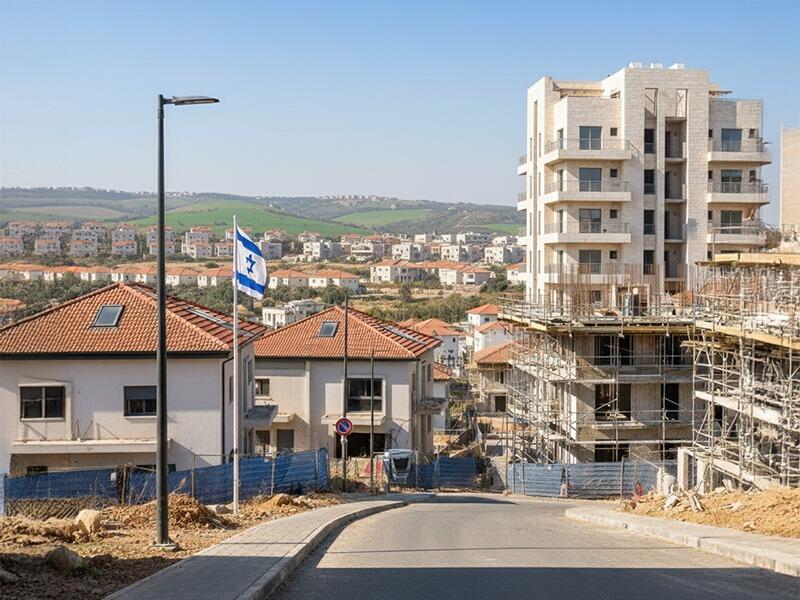The main joy of the festival of Sukkot is over the gathering of fruits and inheriting the Land ● Every time the people of Israel neglected the commandment of settling the Land, they paid heavy prices for it ● Therefore at this time, when a special opportunity is before us, we must not neglect building the Land even at the price of using Arab workers ● A Jew who lives abroad but has a deep connection to the Land, such as one who plans to immigrate soon, does not need to observe the second day of holidays of the diaspora when he stays in the Land
The ‘Three Pilgrimage Festivals’ are connected to the agricultural season in which they fall (Exodus 23:14-16). Passover at the time of spring, when everything begins to sprout, Shavuot at the completion of the grain harvest, and Sukkot at the time of completing the gathering of the year’s fruits. The natural process that occurs in this world reflects the spiritual process that occurs in the upper realms, in the higher dimension of life. Passover is a time of beginning and renewal, and therefore in it we left Egypt and became a people. Shavuot is a time of ripening the growth process of grain, and therefore in it we received the Torah.
Sukkot is a time of completing the gathering of grain and fruits into the house, and so too spiritually it is a time of gathering the spiritual fruits that Israel merited during the days of enslavement in Egypt and wandering in the desert – into their home, namely to the Land of Israel which is the home of Israel. And as the Abarbanel wrote (Deuteronomy 16:13), that the main joy of Sukkot is over inheriting the Land, the festival of Matzot over the uniqueness of Israel that was revealed in the Exodus from Egypt, and Shavuot over the giving of Torah.
Therefore, it is proper that we awaken in the festival of Sukkot that comes upon us for good to the commandment of settling the Land.
Alacrity in the Commandment of Settling the Land
Many greatly regret the delays in applying sovereignty over Judea and Samaria in the past two years, but no less must we regret the cessation of building in Judea and Samaria in the past two years, which depends on us, the settlers. Whether sovereignty is applied or delayed, the future of Judea and Samaria will be decided by the number of Jews who will live in Judea and Samaria, especially in the settlements in Gav Ha’Har (the mountain ridge area in Samaria).
In the past year and a half, the gates have opened for expanding settlement in Judea and Samaria. Struggles that lasted many years around building permit policies succeeded in ending under the leadership of Minister Bezalel Smotrich, and today it is possible to plan and build in the settlements of Judea and Samaria without limitation. It would have been possible to double and triple the pace of building in Judea and Samaria, but following mistaken decisions by settlements and councils (not to build with Arabs), instead of the building pace being accelerated, it was greatly slowed. These were the most difficult two years for building and absorption in Judea and Samaria.
It is true that employing hostile workers has one point of encouragement in their favor, but in our favor, there are nine points from it. So that when we continue to build, the result is nine-one in our favor, and when we refrain from building, the result is nine-one in their favor.
The Price for Delay in the Commandment of Settling the Land
From time immemorial the commandment of Yishuv Ha’Aretz (settling the Land of Israel) requires alacrity. When Israel left Egypt, it was the appropriate time to inherit the Land. Had Children of Israel agreed immediately to enter the Land under Moses’ leadership, we would have merited an eternal building, and the nations would not have been able to rule over the Temple. But because of the sin of the Spies, we were delayed, and lost the moment. Afterward, when the Ma’apilim wanted to go up, it was already too late.
Our Sages said that had Moses our teacher asked immediately that God forgive him and agree to bring him into the Land, he would have been answered. But he delayed close to forty years, and then when he pleaded with God, it was already too late, and God did not answer (see Deuteronomy Rabbah 2:3).
When Cyrus called upon Israel to go up to the Land toward the establishment of the Second Temple, most of Israel could have responded to his call, and they would have merited that the Divine Presence dwell in the Second Temple as in the First, they would have merited prophecy, and they could have merited complete redemption. But since they went up little by little, they lost the moment and did not merit all this, and the Temple was destroyed, and we went out to a long exile (see Yoma 9b).
The Price in Modern Times
About 120 years ago, at the time of the founding of the Zionist movement, the Jewish people numbered about 11 million, while the Arabs who resided in all the areas surrounding the borders of biblical Land of Israel, including Lebanon, Syria and Iraq, numbered slightly more than five million, and on both sides of the Jordan, slightly more than half a million Arabs lived. There was then the opportunity for the Jewish people to return to the Land, to be fruitful and multiply in it. But for various reasons, we delayed. This was in the category of the ‘Sin of the Spies’ of our times, and as we were warned in the Torah, the price for this was terrible. We went through the Holocaust, the rule of Communist oppression, and assimilation. And thus today, in all the world, there are about 15 million declared Jews, and in the Land, about seven million. In contrast, the Arabs in the surroundings of the Land of Israel merited to enjoy the fruits of the industrial revolution, expansion of food production and improvement of medicine, and rose from five million, to more than 80 million.
After the Liberation of Judea and Samaria
After the Six-Day War, it would have been possible with relative ease to settle Judea and Samaria with masses of Jews and apply sovereignty over them. For about twenty years, there was then no significant international pressure against this. If we had acted thus, we would have established facts, and today, more than two million Jews would be living in Judea and Samaria. Our national and security situation would have been incomparably better.
But when it was possible, we delayed greatly, the Arabs and other haters of Israel organized. Severe pressures were applied on the State of Israel to withdraw, and building and settlement advanced slowly, while dealing with terror, and severe pressures and obstacles from within and without.
The Great Challenge Today
Today it is possible to build almost without limitation, and our delay shows to the people of Israel, and to the entire world, that settling Judea and Samaria is not very important to us, and God forbid, the pressures may greatly increase.
Let us not think “we have done much for the settlement, and this merit will stand for us.” Since we began the commandment, the responsibility is upon us to complete it. Our Sages said: “Anyone who begins a commandment and does not complete it – buries his wife and his children. From whom do you learn? From Judah” (Genesis Rabbah 85:3). Judah began to save Joseph, the brothers listened to him, and agreed not to kill Joseph, but instead of saving him and returning him to his father, he agreed with them, and they sold Joseph. The punishment was severe. Just as he stopped in the middle and did not complete the commandment he began, so his family stopped in the middle. Only after he repented, and admitted to Tamar that he erred, did he merit to return and establish a family.
We must return to building and absorbing more masses of families to Judea and Samaria, to thereby defend the people and the Land, and to fulfill the great commandment of settling the heart of the Land.
A Commandment to Gladden Torah Teachers on the Festival
In the general commandment to rejoice on the festival, there is a commandment to also gladden the Levite, as it is said: “And you shall rejoice in your festival, you and your son and your daughter and your male servant and your female servant and the Levite” (Deuteronomy 16:14). The role of the Levites was to teach and educate the Children of Israel, young and old. And even after the destruction of the Temple, Rabbi Shlomo Cohen of Vilna explained (Binyan Shlomo 1:33), that there is a commandment to gladden on the festival the rabbis, teachers of law, and teachers of Torah (he did not mention this in his responsum, but there is reason to add that in his day, the economic status of rabbis in Eastern Europe was very poor).
Today, this commandment continues toward all male and female teachers who engage in educating the Children of Israel to Torah and commandments, and good character traits. For they too, like Levites, engage in teaching, and they too, like Levites, are considered as those who cannot become wealthy, but engage in the holy work of educating the Children of Israel.
Second Day of Holidays of the Diaspora in Complex Situations
Q: I was born and raised in Israel and my parents also live in Israel, while my wife grew up in the United States from age three, until today. We married four and a half years ago, and lived in the United States when the plan was to come to Israel after about a year. We have some delays, and we are still living in the United States, but we intend to immigrate to Israel with God’s help soon, but we still do not have a concrete date.
At first, since I had a concrete date to return to Israel, I did not observe Yom Tov Sheni (the second day of Chag in the Diaspora) properly, but only publicly. After two-three years, since I did not have a concrete date to immigrate to Eretz Yisrael, I became stricter with myself to observe the second holiday day properly. During these years, my wife observed the second holiday day.
Until today, when we came to the Israel for holidays, I did not observe the second holiday day, in contrast my wife observed the second holiday day. I thought that my wife should observe only one day of Chag in Eretz Yisrael, since, according to halakha, she follows after her husband. But she does not feel comfortable observing only one day, since mentally it is difficult for her not to observe the second day of Chag to which she is accustomed, and moreover, we are about to return abroad after the holiday. Furthermore, she wants me also to observe the second day of Chag in Israel. In any case, we reached an agreement that we would ask you, Rabbi (my wife also enjoys learning your halakha books in English).
A: According to what you described, when you are abroad, you too must observe two days of Yom Tov, since that is your place currently. And when you come to Israel, your wife too must observe only one day, since based on three reasons you have a deep connection to the Land: a) Such is the law for one who once lived in the Land and considers perhaps in the future to return and immigrate. b) Such is the law for one whose father or child lives in the Land and considers perhaps immigrating to the Land in the future. c) Such is the law for one who has a near plan to immigrate to the Land (as explained in “Peninei Halakha: Festivals” 9:8, anyone who has a deep connection to the Land, even if he lives abroad, when he is in the Land, he must observe only one day).
Follow-up Question About Flying on Yom Tov Sheni
Question that arrived after about a year: With the Rabbi’s permission, I have another question. We are coming to Israel for the holiday, and observing only one day according to the Rabbi’s ruling. We bought tickets for a flight that departs toward the end of the prohibition of the holiday, but when we leave the borders of the Land, it will turn out that for a certain time, we will fly during a time that is Yom Tov Sheni of the Diaspora. Are we obligated in the Yom Tov Sheni of the Diaspora when we are on the plane? Is there an halachic prohibition of techumin (boundaries) in this?
A: You can fly on the flight you described, since you boarded the plane in Eretz Yisrael, and as long as you are in the skies, you do not need to observe two days of Yom Tov.
This article appears in the ‘Besheva’ newspaper and was translated from Hebrew.








